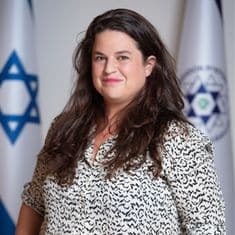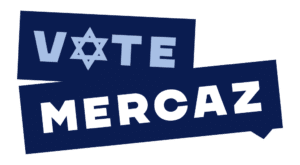It’s Time to Ensure Israel’s Inclusive Future
April 22, 2025 in Israel

TammyGottlieb
As the 39th World Jewish Congress Election continues, with voting open until May 4, we asked Mercaz representative Tammy Gottlieb, vice chair of Women of the Wall and member of the World Zionist Organization Executive, about some issues at stake at this pivotal time for the State of Israel. Mercaz USA (Slate 17) represents the Conservative/Masorti movement within the World Zionist Organization and Congress, the Jewish Agency for Israel, the American Zionist Movement, and the Jewish National Fund, and advocates for funding of pluralistic streams of Judaism in Israel. Key to its multi-point platform is the vision of a society “that celebrates democratic principles, embraces diverse Jewish traditions, and safeguards the rights, dignity and inclusion of all its citizens.”
Question: Many consider Israel at a crossroads due to the rise of right-wing extremist parties in the Knesset, and the continued distress of war. How do you see the World Zionist Organization Congress countering such “illiberal” influences? Can the Conservative and Reform voices keep pace?
Gottlieb: So of course, how WZO will act in response to the rise of illiberal forces in Israel and the Jewish world depends on who’s elected to the Congress. Ultimately, WZO is a not static organization: it is who gets elected to the Congress that decides what the organization is and what stands it takes. That’s who sets the organization’s policies and tone. So yes, (MK Itamar) Ben Gvir and (Finance Minister Betzalel) Smotrich will be represented in the next Zionist Congress – they have seats in the Knesset, which means they will have some representation in the next Zionist Congress.
But how much power they’ll have though depends on one thing and one thing only: how many people who want to stand up for liberal and democratic values vote for slates like the Reform and Conservative slates that will do so. So before it’s a question of ‘what will WZO do?’ it’s a question of ‘who will WZO be?’ and that is firmly in the hands of eligible voters like you! Your vote can ensure a majority in favor of liberal and democratic values, and that makes sure the Diaspora’s voice that’s heard in Israel is one that’s pro-democracy and pro-democratic values.
Question: The continuing waves of antisemitism seen in the U.S. and in many other countries has made Diaspora Jews feel exceptionally vulnerable. Are there plans for the Congress to designate more funds to fight antisemitism? Who might receive them?
Gottlieb: A lot of money is designated by the national institutions – the organizations under the co

ntrol of the Zionist Congress including WZO, Keren Kayemet L’Yisrael/Jewish National Fund (KKL/JNF), and the Jewish Agency – to initiatives to help fight antisemitism. For example, Mercaz helped lead the charge to get KKL/JNF to make its largest ever investment in Jewish education and continuity programming outside of Israel: about $60 million.
What makes the Conservative and Reform slates, Mercaz and Arza, particularly important voices in the Congress is that they don’t have any ties to any Israeli political party, which means for them, securing more funding for programs outside of Israel – whether it’s combating antisemitism, or Jewish or Zionist education – is always a top priority. They work for you and only you as Diaspora Jews. The Reform and Conservative slates are also often the largest voices pushing for funding to go to more pluralistic institutions rather than ones with a specific religious or political agenda or ties to a particular slate in the Congress. For instance, fighting for funding to go to Hillel on campuses, which might otherwise miss out because it doesn’t have the same type of political representation in the Congress as say, some of the more right-wing or religious campus organizations.
Question: As the war has continued, students at American universities seem more inclined to sympathize with the Palestinians, [and even] those who pledge to destroy Israel. What can WZO do to stop this threat … and further promote Jewish Peoplehood?
Gottlieb: Referring back to the prior answer, when it comes to campuses, there’s much being done but still of course a lot of work to do. When it comes to promoting Jewish Peoplehood, the Vice Chairman of WZO’s Office – led by Yizhar Hess, the senior representative of Mercaz, the Conservative slate – is responsible for WZO’s Jewish Peoplehood programming, organizing a lot of innovative programming to bridge the gap between Israelis and Diaspora Jews with its programming. In both directions.
From organizing a major annual conference on Israel-Diaspora relations, to visiting with and engaging Jewish and pro-Israel student leaders on campuses in nearly every city he visits, to seminars for pre-army preparatory programs where many young Israelis from diverse backgrounds are exposed to the various streams of Judaism from the Diaspora for the first time, to a one-man play on Abraham Joshua Heschel that has exposed countless Israelis to one of American Jewry’s preeminent figures.
But the ability to continue to promote such programming – and overall, what the national institutions’ priorities will be in the coming years – these are all dependent on the results of elections to the Congress. Which is why it’s so important you vote for a slate like the Conservative Movement’s Mercaz that shares our values and has a proven track record of getting things done.
Any Jewish adult over age 18 who lives permanently in the U.S. and didn’t vote in the last Knesset election can vote in the World Zionist Congress elections. Voting costs $5 and can be completed online until May 4th. To learn more about the WJC electoral process and most importantly, to vote, visit the official US Election for the 39th World Zionist Congress site here.